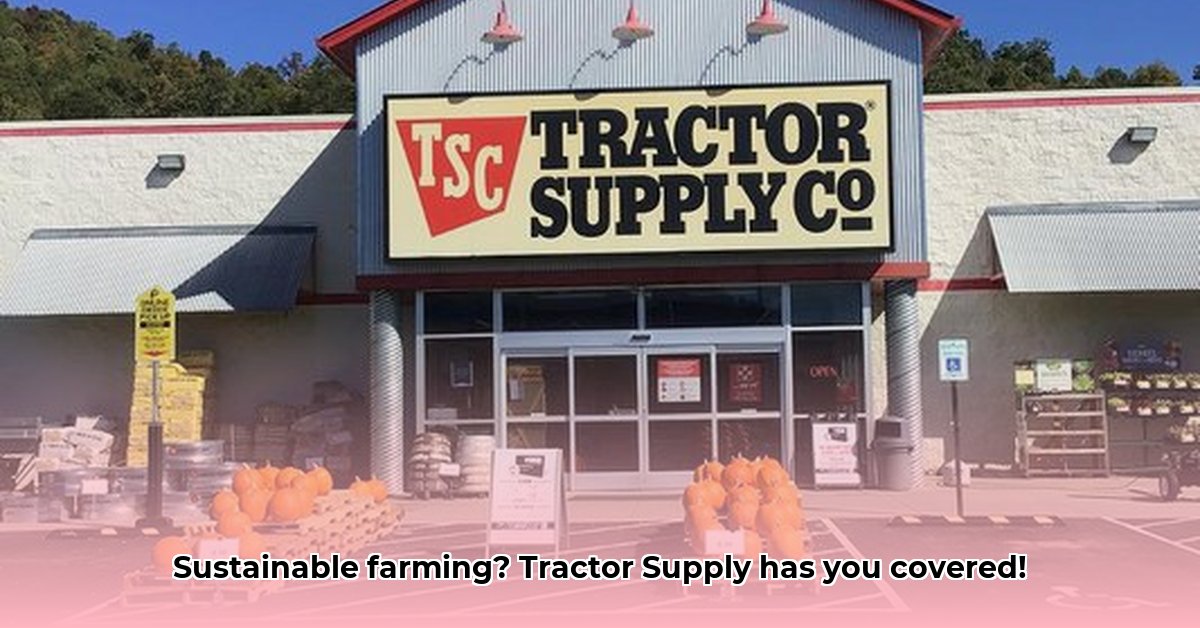
Tractor Supply in Williamsburg, KY: A Resource for Sustainable Farming?
Finding the right supplies for sustainable farming can be challenging. This article explores the potential of Tractor Supply in Williamsburg, KY, as a resource for local farmers seeking eco-friendly options. We'll examine its accessibility, product offerings, and the community's interest in sustainable agriculture. While complete data is limited, we'll identify actionable steps to better utilize and improve the store's role in supporting sustainable farming practices. How can this local store better serve the needs of environmentally conscious farmers? For additional resources on sustainable farming practices, check out this helpful guide: Goat Mineral Supplements.
Accessibility and Location: A Convenient Starting Point
Tractor Supply's Williamsburg location boasts excellent accessibility, situated near major roadways such as I-75 and US-25W. This makes it convenient for farmers in Williamsburg and surrounding areas like Woodbine and Jellico. This geographic advantage is crucial, but does it translate to a sufficient selection of sustainable products?
Assessing Sustainable Product Availability: The Need for Transparency
Currently, comprehensive information on the Williamsburg Tractor Supply's sustainable product inventory is lacking. Detailed data on organic fertilizers, energy-efficient tools, and other eco-friendly farming supplies is needed for a thorough assessment. This lack of transparency hinders a complete understanding of the store's contribution to sustainable agriculture within the community.
Community Context: A Vibrant Interest in Sustainability
Williamsburg demonstrates a strong community connection to nature, evidenced by the proximity of Briar Creek Park. This suggests considerable local interest in sustainable practices, creating a potential market for eco-friendly farming products. However, bridging this community interest with the actual offerings of the local Tractor Supply remains a crucial step.
Actionable Steps: A Collaborative Approach
To comprehensively assess and enhance the role of the Williamsburg Tractor Supply in supporting sustainable farming, a collaborative approach is critical. The following steps are needed, encompassing both short-term and long-term actions.
Short-Term Actions (Within the Next Year):
- Farmer Inventory Assessment: Farmers should directly examine the store's inventory, noting available sustainable supplies and providing feedback to store management about unmet needs.
- Tractor Supply Inventory Analysis: Tractor Supply should conduct a detailed inventory analysis of its Williamsburg store, clearly identifying and publicly highlighting sustainable products through online listings, in-store signage, and local community newsletters.
- Community Needs Assessment: Gather data on community interest in sustainable farming resources through surveys, workshops, or collaborations with local organizations.
- Targeted Research: Initiate a case study focusing on access to sustainable farming resources in the Williamsburg area, specifically evaluating the local Tractor Supply's role and broader community impact.
Long-Term Actions (Over the Next 3-5 Years):
- Continued Advocacy: Farmers should actively advocate for a broader selection of sustainable products within the Williamsburg Tractor Supply.
- Company-Wide Sustainability Initiatives: Tractor Supply should consider a company-wide initiative to prioritize and promote products with relevant sustainability certifications.
- Community Partnerships: Foster strong partnerships between the store and local environmental and agricultural organizations to leverage additional resources and expertise.
- Longitudinal Impact Assessment: Conduct a long-term analysis of the effectiveness of sustainable practices supported by Tractor Supply, evaluating their community-level impact and using data to inform future strategies.
The Importance of Data: Illuminating the Path Forward
The current understanding of the Williamsburg Tractor Supply's role in promoting sustainable farming is limited by the lack of readily available data. Detailed inventory lists, sales data, and customer surveys would significantly improve our understanding. These data points are vital for informed decision-making and achieving positive community impact. Without greater transparency, a complete evaluation of their sustainability efforts remains impossible.
Building a Sustainable Future: A Collaborative Vision
By fostering collaboration among farmers, the community, Tractor Supply, and researchers, Williamsburg can build a more sustainable agricultural future. Open communication, data-driven decision making, and a shared commitment are key to maximizing the potential positive change for this community.
How to Access Sustainable Farming Supplies Near Williamsburg, KY
Key Takeaways:
- Tractor Supply offers a wide range of agricultural products.
- Many offerings align with sustainable practices, though explicit labeling may be limited.
- Direct engagement with staff and careful label examination are essential to identify sustainable options.
- Supplementing TSC with local resources can broaden access to sustainable supplies.
Utilizing Tractor Supply for Sustainable Farming
While not solely focused on sustainable products, Tractor Supply provides an accessible resource for many farmers. To effectively leverage their offerings:
- Targeted Shopping: Research specific sustainable products before visiting the store.
- Label Scrutiny: Carefully examine labels for certifications or indicators of sustainable production.
- Direct Communication: Engage with staff to ask about product sourcing and sustainability.
- Diversified Sourcing: Supplement TSC purchases with other local providers specializing in sustainable agriculture.
Future Considerations and Limitations
Tractor Supply plays a valuable role, but greater transparency around its supply chain practices and a commitment to offering more explicitly sustainable options would enhance its appeal to environmentally conscious farmers. Utilizing this store effectively requires a proactive approach and supplementary sourcing from other businesses. Ultimately, achieving sustainable farming requires a multifaceted approach including multiple resources.